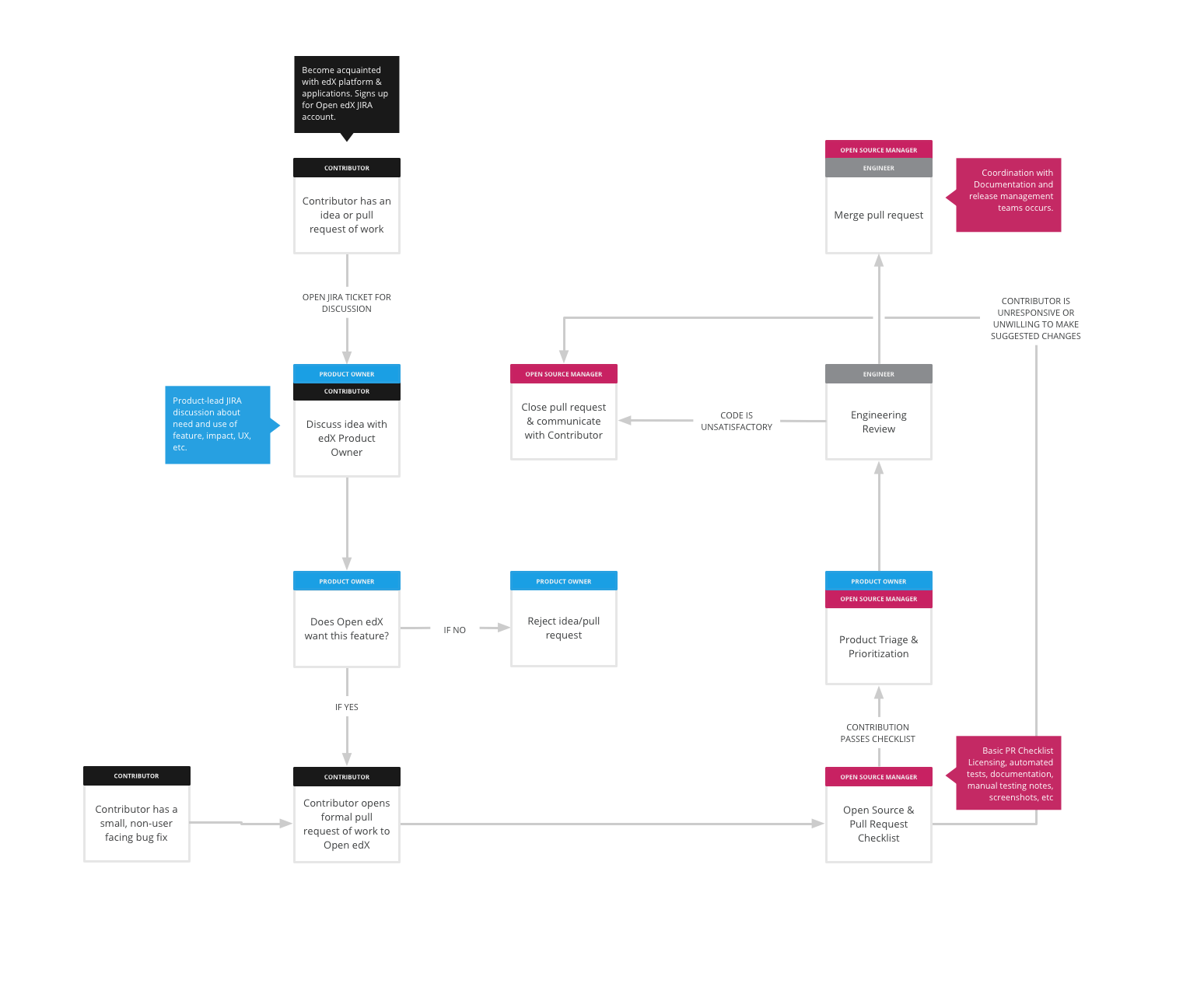3.1. Process for Contributing Code¶
Open edX is a massive project, and we would love you to help us build the best online education system in the world – we can’t do it alone! However, the core committers on the project are also developing features and creating pull requests, so we need to balance reviewing time with development time. To help manage our time and keep everyone as happy as possible, we’ve developed this document that explains what core committers and other contributors can expect from each other. The goals are:
- Keep pull requests unblocked and flowing as much as possible, while respecting developer time and product owner prioritization.
- Maintain a high standard for code quality, while avoiding hurt feelings as much as possible.
3.1.1. Overview¶
Get in touch with us right now! We want to talk to you about your work as early as possible in your development cycle, ideally when you start designing your feature. This will help you so much, we promise: we’ll help guide your work so you don’t have to rearchitect it late in your development cycle. We’ll help you understand the analytics, performance, test, accessibility, and other various requirements up front. We’ll also be able to let you know if work you’re planning duplicates work edX or others are doing. Finally, we’ll let you know if your proposal, or parts of your proposal, would benefit from the Open edX Proposal (OEP) process.
You can get in touch with us using our Community Discussions.
You should get in touch with us regarding any work you intend to contribute upstream, including but not limited to these types of contributions.
- Core platform changes (changes to the edx-platform repo).
- Changes to any associated repos (edx-analytics, configuration, XBlock, etc.).
- A new XBlock you’re writing that you intend to have run on edx.org.
We do not need to review your code if you are writing a tool or customization for your own installation.
- An XBlock to be run on your own server, not intended to run on edx.org.
- LTI tools that are running on an external server.
- Code you are writing for your own installation, that won’t be run on edx.org.
Make sure you’ve signed a contribution agreement before you submit code upstream to any edX owned repo. Please be sure you’ve at least skimmed the contributor guidelines, especially the pull request cover letter guidelines.
If you have any process questions along the way, please reach out to us on the edx-code mailing list.
Once you open your pull request, we’ll need to review it. What types of review are necessary will be determined by the complexity of your pull request and whether or not you’ve spoken to us before you open your pull request. An overview of the process is here:

3.1.2. General Guidelines¶
Please follow these guidelines when writing code. Please note that not all of these may be required for your feature; reach out to us if you have any questions or concerns.
- Internationalization Coding Guidelines
- RTL UI Best Practices
- Accessibility Guidelines
- Analytics Guidelines
- Eventing Design and Review Process
For XBlocks you intend to install on edx.org, please also read the XBlock Review Guidelines.
3.1.3. Roles¶
People play different roles in the pull-request review process. Each role has different jobs and responsibilities.
- Core Committer
- Can commit changes to an Open edX repository. Core committers are responsible for the quality of the code, and for supporting the code in the future. Core committers are also developers in their own right.
- Product Owner
- Prioritizes the work of core committers.
- Community Manager
- Helps keep the community healthy and working smoothly.
- Contributor
- Submits pull requests for eventual committing to an Open edX repository.
If you are a contributor submitting a pull request, expect that it will take a few weeks before it can be merged. The earlier you can start talking with the rest of the Open edX community about the changes you want to make, before you even start changing code, the better the whole process will go.
Follow the guidelines in this document for a high-quality pull request: include a detailed description of your pull request when you open it on GitHub (we recommend using a pull request cover letter to guide your description), keep the code clear and readable, make sure the tests pass, be responsive to code review comments. Small pull requests are easier to review than large pull requests, so split up your changes into several small pull requests when possible – it will make everything go faster. See the full contributor guidelines for details of what to do and what to expect.
If you are a product owner, treat pull requests from contributors like feature requests from a customer. Keep the lines of communication open – if there are delays or unexpected problems, add a comment to the pull request informing the author of the pull request of what’s going on. No one likes to feel like they’re being ignored! More details are in the product owner guidelines.
If you are a core committer, allocate some time in your normal work schedule to review pull requests from other contributors. The community managers will make sure that these pull requests meet a basic standard for quality before asking you to spend time reviewing them. More details are in the core committer guidelines.
Feel free to read the other documentation specific to each individual role in the process, but you don’t need to read everything to get started! If you’re not sure where to start, check out the contributor documentation. Thanks for helping us grow the project smoothly! :)